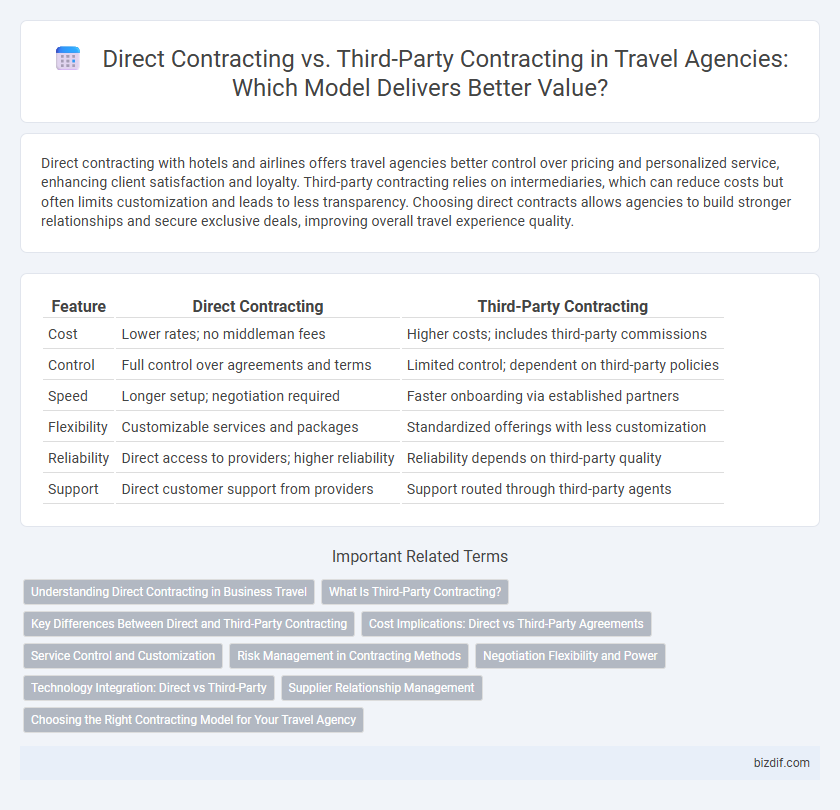Direct contracting with hotels and airlines offers travel agencies better control over pricing and personalized service, enhancing client satisfaction and loyalty. Third-party contracting relies on intermediaries, which can reduce costs but often limits customization and leads to less transparency. Choosing direct contracts allows agencies to build stronger relationships and secure exclusive deals, improving overall travel experience quality.
Table of Comparison
| Feature | Direct Contracting | Third-Party Contracting |
|---|---|---|
| Cost | Lower rates; no middleman fees | Higher costs; includes third-party commissions |
| Control | Full control over agreements and terms | Limited control; dependent on third-party policies |
| Speed | Longer setup; negotiation required | Faster onboarding via established partners |
| Flexibility | Customizable services and packages | Standardized offerings with less customization |
| Reliability | Direct access to providers; higher reliability | Reliability depends on third-party quality |
| Support | Direct customer support from providers | Support routed through third-party agents |
Understanding Direct Contracting in Business Travel
Direct contracting in business travel involves establishing agreements directly with airlines, hotels, or transportation providers, ensuring better rates, customized services, and greater control over travel policies. This approach streamlines expense management and enhances traveler compliance by eliminating intermediaries common in third-party contracting. Companies leveraging direct contracts can optimize loyalty program benefits and gain access to exclusive offers tailored to corporate needs.
What Is Third-Party Contracting?
Third-party contracting in the travel industry involves agencies partnering with external suppliers to access services such as flights, accommodations, and tours, rather than establishing direct agreements. This approach allows agencies to offer a wider range of options quickly without upfront investment in supplier relationships. However, it often results in lower profit margins and less control over service quality compared to direct contracting.
Key Differences Between Direct and Third-Party Contracting
Direct contracting with suppliers ensures travel agencies access to exclusive rates, personalized service, and real-time inventory updates, enhancing customer satisfaction and profit margins. Third-party contracting relies on intermediaries who aggregate multiple services, offering convenience and broader options but often at higher costs and less control. The choice impacts pricing strategies, service quality, and operational flexibility within the travel industry.
Cost Implications: Direct vs Third-Party Agreements
Direct contracting with service providers typically reduces overall travel costs by eliminating intermediary fees, enabling agencies to offer more competitive pricing. Third-party agreements often involve additional markups or commissions, increasing expenses that may be passed on to clients. Travel agencies must evaluate these cost implications carefully to optimize budget allocation and maximize profit margins.
Service Control and Customization
Direct contracting with suppliers in travel agencies ensures greater service control and customization by allowing direct negotiation on pricing, availability, and special requests. Third-party contracting often limits flexibility due to standardized packages and reliance on intermediaries, which can hinder tailored experiences. Agencies prioritizing unique itineraries and personalized service delivery benefit more from direct agreements with hotels, airlines, and tour operators.
Risk Management in Contracting Methods
Direct contracting with suppliers reduces exposure to intermediaries, enabling travel agencies to maintain greater control over service quality and mitigate risks related to miscommunication or contract breaches. Third-party contracting can introduce additional risks such as dependency on external agents' reliability and potential delays in issue resolution, which may impact overall customer satisfaction. Effective risk management requires assessing supplier credibility, establishing clear contract terms, and implementing monitoring mechanisms regardless of the contracting method chosen.
Negotiation Flexibility and Power
Direct contracting grants travel agencies greater negotiation flexibility and power by allowing personalized agreements with suppliers, often leading to better pricing and exclusive offers. Third-party contracting limits this leverage due to standardized terms and reliance on intermediary platforms, which can restrict agency customization. Consequently, direct relationships enhance agency control over service quality and profit margins.
Technology Integration: Direct vs Third-Party
Direct contracting enables seamless technology integration by allowing travel agencies to access suppliers' APIs for real-time inventory, pricing, and availability updates, which ensures efficient booking processes and enhanced customer experience. Third-party contracting relies on external platforms that aggregate multiple suppliers but may introduce latency and limited customization due to API standardization and data sharing constraints. Direct integration offers greater control over technology stack optimization, enabling personalized interfaces and faster response times compared to third-party solutions that depend on middleman systems.
Supplier Relationship Management
Direct contracting in travel agencies fosters stronger supplier relationship management through customized agreements and better negotiation leverage, leading to exclusive offers and improved service quality. Third-party contracting simplifies operations by outsourcing supplier interactions to intermediaries, but it may reduce control over pricing and inventory availability. Efficient supplier relationship management in direct contracts enhances real-time communication and responsiveness, critical for personalized travel experiences and dynamic package adjustments.
Choosing the Right Contracting Model for Your Travel Agency
Direct contracting with hotels and airlines enables travel agencies to secure better rates, exclusive deals, and greater control over inventory, boosting profit margins and customer satisfaction. Third-party contracting offers access to a broader range of suppliers quickly but often involves higher costs and less negotiation power. Travel agencies must evaluate factors such as budget, target market, and desired service level to choose the contracting model that aligns best with their operational goals and growth strategy.
Direct Contracting vs Third-Party Contracting Infographic

 bizdif.com
bizdif.com